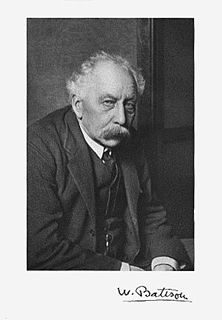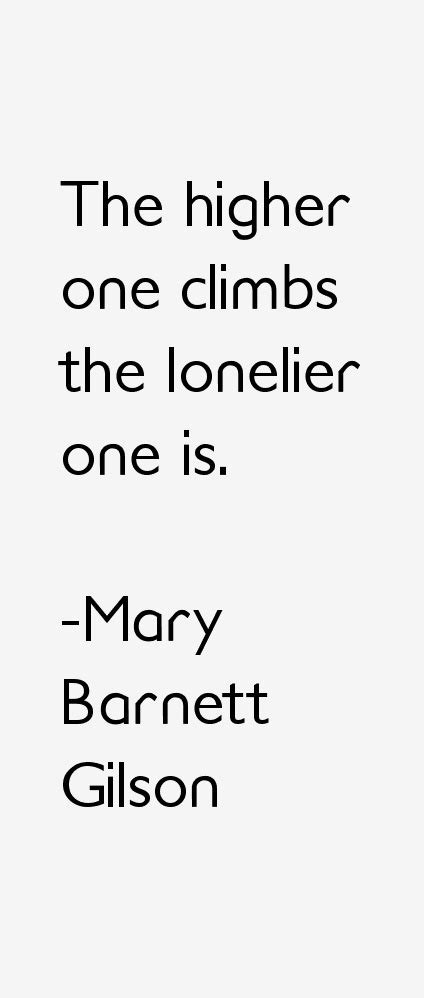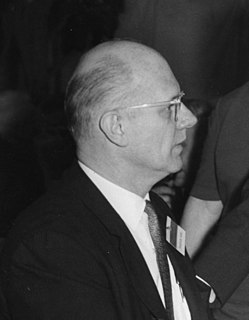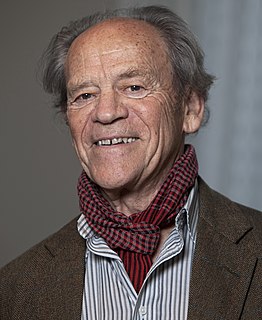Top 890 Sciences Quotes & Sayings - Page 12
Explore popular Sciences quotes.
Last updated on December 4, 2024.
I have never found out that there was in my family an artist or anyone interested in the arts or sciences, and I have never been sufficiently interested in my 'family tree' to bother. My father and mother had come to America on one of those great waves of immigration that followed persecution and pogroms in Czarist Russia and Poland.
The problem, once again, as in all sciences is the attitude of the mind that is dealing with whatever field. The problem is not philosophy but the lack of intellectual humility. It is when reason becomes arrogant that we lose track. But intellectual humility with science: this is spirituality - this is the way we are with God. So we should not be scared and we must reconcile ourselves.
Let's stick to the practical and the concrete: Would you like it if people lived in a virtual world? If machines were smarter than people? If, in the future, people, animals and plants were products of technology? If you don't like these ideas, then for you the computer and biological sciences clearly are dangerous.
You make a great investment in the consumer Internet, maybe you make a lot of money and create something useful, interesting, or fun. But in life sciences, you have a chance to be part of something that lets people live longer and healthier and not lose the people they care about. That is really profound.
Even when laws have been written down, they ought not always to remain unaltered. As in other sciences, so in politics, it is impossible that all things should be precisely set down in writing; for enactments must be universal, but actions are concerned with particulars. Hence we infer that sometimes and in certain cases laws may be changed.
I am not able to instruct you. I can only tell that I have chosen wrong. I have passed my time in study without experience; in the attainment of sciences which can, for the most part, be but remotely useful to mankind. I have purchased knowledge at the expense of all the common comforts of life: I have missed the endearing elegance of female friendship, and the happy commerce of domestic tenderness.
Years should not be devoted to the acquisition of dead languages or to the study of history which, for the most part, is a detailed account of things that never occurred. It is useless to fill the individual with dates of great battles, with the births and deaths of kings. They should be taught the philosophy of history, the growth of nations, of philosophies, theories, and, above all, of the sciences.
We ought not to believe those who today, adopting a philosophical air and with a tone of superiority, prophesy the decline of culter and are content with the unknowable in a self-satisfied way. For us there is no unknowable, and in my opinion there is also non whatsoever for the natural sciences. In place of this foolish unknowable, let our watchword on the contrary be: we must know - we shall know.
There is knowledge of God and the spiritual nature of man, as well as other types of reality..., that are not reducible to the world dealt with by the so-called "natural" sciences. The idea that knowledge - and, of course, reality - is limited to that world is the single most destructive idea on the stage of life today.
'Tis certain that a serious attention to the sciences and liberal arts softens and humanizes the temper, and cherishes those fine emotions in which true virtue and honor consist. It rarely, very rarely happens that a man of taste and learning is not, at least, an honest man, whatever frailties may attend him.
The new supplants the old. Yet men's minds are stuffed with outworn bunk. Educating the young in the latest findings of authorities and scholars in the social sciences is important. It is equally important to devise ways and means for aiding the middle-aged and old to reexamine hang-over unscientific doctrines and ideas in the light of recent discovery and research.
Life is girt all round with a zodiac of sciences, the contributions of men who have perished to add their point of light to our sky. ... These road-makers on every hand enrich us. We must extend the area of life and multiply our relations. We are as much gainers by finding a property in the old earth as by acquiring a new planet.
Darwin's book is very important and serves me as a basis in natural science for the class struggle in history. One has to put up with the crude English method of development, of course. Despite all deficiencies not only is the death-blow dealt here for the first time to 'teleology' in the natural sciences, but their rational meaning is empirically explained.
I entered the literary world, really, from outside. My entire background has been in sciences; I was a biology major in college, then went to medical school. I've never had any formal training in writing. So what I know about writing, I know from my own instincts, and whatever the narrative voice is in my own head.
Whatever other children learn in a year, let Bahá’í children learn in a month. The heart of ‘Abdu’l-Bahá longeth, in its love, to find that Bahá’í young people, each and all, are known throughout the world for their intellectual attainments. There is no question but that they will exert all their efforts, their energies, their sense of pride, to acquire the sciences and arts.
I picture the vast realm of the sciences as an immense landscape scattered with patches of dark and light. The goal towards which we must work is either to extend the boundaries of the patches of light, or to increase their number. One of these tasks falls to the creative genius; the other requires a sort of sagacity combined with perfectionism.
One could count on one's fingers the number of scientists throughout the world with a general idea of the history and development of their particular science: there is none who is really competent as regards sciences other than his own. As science forms an indivisible whole, one may say that there are no longer, strictly speaking, scientists, but only drudges doing scientific work.
Kuhn was the intellectual of whom many scientists said he's 'telling it as is it is' insofar as talking about a process of 'tinkering' in terms of theory and experiment followed by radical changes. But often, what Kuhn had in mind were some very spectacular incidents in the history of the sciences that changed our way of looking at the world.
In my more than 60 years as a member of the American scientific community, including service as president of both the National Academy of Sciences and the American Physical Society, I have never witnessed a more disturbing corruption of the peer-review process than the events that led to this IPCC report.
All minds quote. Old and new make the warp and woof of every moment. There is no thread that is not a twist of these two strands. By necessity, by proclivity, and by delight, we all quote. We quote not only books and proverbs, but arts, sciences, religion, customs, and laws; nay, we quote temples and houses, tables and chairs, by imitation.
It is impossible to discuss realism in logic without drawing in the empirical sciences... A truly realistic mathematics should be conceived, in line with physics, as a branch of the theoretical construction of the one real world and should adopt the same sober and cautious attitude toward hypothetic extensions of its foundation as is exhibited by physics.
In the case of all other sciences, arts, skills, and crafts, everyone is convinced that a complex and laborious programme of learning and practice is necessary for competence. Yet when it comes to philosophy, there seems to be a currently prevailing prejudice to the effect that, although not everyone who has eyes and fingers, and is given leather and last, is at once in a position to make shoes, everyone nevertheless immediately understands how to philosophize.
To spread healthy ideas among even the lowest classes of people, to remove men from the influence of prejudice and passion, to make reason the arbiter and supreme guide of public opinion; that is the essential goal of the sciences; that is how science will contribute to the advancement of civilization, and that is what deserves protection of governments who want to insure the stability of their power.
All the sciences have a relation, greater or less, to human nature; and...however wide any of them may seem to run from it, they still return back by one passage or another. Even Mathematics, Natural Philosophy, and Natural Religion, are in some measure dependent on the science of MAN; since they lie under the cognizance of men, and are judged of by their powers and faculties.
[E]volutionists sometimes take as haughty an attitude toward the next level up the conventional ladder of disciplines: the human sciences. They decry the supposed atheoretical particularism of their anthropological colleagues and argue that all would be well if only the students of humanity regarded their subject as yet another animal and therefore yielded explanatory control to evolutionary biologists.
The science of the church is neglected for the study of geometry, and they lose sight of Heaven while they are employed in measuring the earth. Euclid is perpetually in their hands. Aristotle and Theophrastus are the objects of their admiration; and they express an uncommon reverence for the works of Galen. Their errors are derived from the abuse of the arts and sciences of the infidels, and they corrupt the simplicity of the gospel by the refinements of human reason.
It takes a long time for a country to build a strong base in science, but only a short time to destroy it. Germany was a sad example. It was a world leader in the sciences for more than a century, until its science base was demolished during the Nazi era, and the country ceded its position to the United States.
[The notion of equilibrium] is a notion which can be employed usefully in varying degrees of looseness. It is an absolutely indispensable part of the toolbag of the economist and one which he can often contribute usefully to other sciences which are occasionally apt to get lost in the trackless exfoliations of purely dynamic systems.
And Botany I rank with the most valuable sciences, whether we consider its subjects as furnishing the principal subsistence of life to man and beast, delicious varieties for our tables, refreshments from our orchards, the adornments of our flower-borders, shade and perfume of our groves, materials for our buildings, or medicaments for our bodies.
The battle over the validity of evolution has been publicly posed as a scientific one. However, you will find little sign of it in scientific journals, where such quarrels as exist are over details, not the basic concept... Evolution has proved so useful as a paradigm for the origin and structure of life that it constitutes the foundation of the sciences of biology and medicine.
Art and science work in quite different ways: agreed. But, bad as it may sound, I have to admit that I cannot get along as an artist without the use of one or two sciences. ... In my view, the great and complicated things that go on in the world cannot be adequately recognized by people who do not use every possible aid to understanding.
If we take seriously the word-flesh Christology of Chalcedon (i.e., the doctrine that Christ is fully human and fully divine) and view Christ as the telos toward which God is drawing the whole of creation, then any view of the sciences that leaves Christ out of the picture must be seen as fundamentally deficient.
One of the great disadvantages of a literary or scriptural tradition like the biblical one is that a deity or context of deities becomes crystallized, petrified at a certain time and place. The deity doesn’t continue to grow, expand, or take into account new cultural forces and new realizations in the sciences, and the result is this make-believe conflict we have in our culture between science and religion.
For some students, especially in the sciences, the knowledge gained in college may be directly relevant to graduate study. For almost all students, a liberal arts education works in subtle ways to create a web of knowledge that will illumine problems and enlighten judgment on innumerable occasions in later life.
I do get a little disheartened when you hear about how many girls get discouraged to not pursue a career in the sciences, and I feel like seeing women that are portrayed in this way - and beyond that, just three dimensional, complicated women - those are always going to be the stories that I gravitate to most.
The great end of all human industry is the attainment of happiness. For this were arts invented, sciences cultivated, laws ordained, and societies modeled, by the most profound wisdom of patriots and legislators. Even the lonely savage, who lies exposed to the inclemency of the elements and the fury of wild beasts, forgets not, for a moment, this grand object of his being.
...there are special sciences not because of the nature of our epistemic relation to the world, but because of the way the world is put together: not all natural kinds (not all the classes of things and events about which there are important, counterfactual supporting generalizations to make) are, or correspond to, physical natural kinds.
The course of the line we indicated as forming our grandest terrestrial fold [along the shores of Japan] returns upon itself. It is an endless fold, an endless band, the common possession of two sciences. It is geological in origin, geographical in effect. It is the wedding ring of geology and geography, uniting them at once and for ever in indissoluble union.
I have always thought that clarity is a form of courtesy that the philosopher owes; moreover, this discipline of ours considers it more truly a matter of honor today than ever before to be open to all minds ... This is different from the individual sciences which increasingly [interpose] between the treasure of their discoveries and the curiosity of the profane the tremendous dragon of their closed terminology.
Fact is, awards shows were never really about recognizing achievement. They were a publicity ploy cooked up in the late 1920s by MGM topper Louie Mayer and his newly formed Academy of Motion Picture Arts and Sciences which was itself, back in the day, nothing but a front organization to discourage unionizing.
The main object of the work was to present such a survey of the advances already made in physical knowledge, and of the mode in which they have been made, as might serve as a real and firm basis for our speculations concerning the progress of human knowledge, and the processes by which sciences are formed.
I think people all over the institution recognize that different ways of understanding are valuable. Artists may think in a different way than biologists or chemists, but you can learn something from that. It is true that the arts at MIT don't have the same amount of funding or same status as the sciences or engineering.
For this knowledge of right living, we have sought a new name... . As theology is the science of religious life, and biology the science of [physical] life ... so let Oekology be henceforth the science of [our] normal lives ... the worthiest of all the applied sciences which teaches the principles on which to found... healthy... and happy life.
I'm not an historian but I'll venture an opinion: Modern cosmology really began with Darwin and Wallace. Unlike anyone before them, they provided explanations of our existence that completely rejected supernatural agents... Darwin and Wallace set a standard not only for the life sciences but for cosmology as well.
Without an acquaintance with chemistry, the statesman must remain a stranger to the true vital interests of the state, to the means of its organic development and improvement; ... The highest economic or material interests of a country, the increased and more profitable production of food for man and animals, ... are most closely linked with the advancement and diffusion of the natural sciences, especially of chemistry.
























































